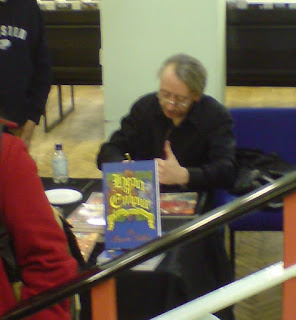 Last night I attended a talk at Leicester central lending library by Bryan Talbot. I initially attended simply to have him sign my copy of Alice in Sunderland but it turned out to be a very interesting talk.
Last night I attended a talk at Leicester central lending library by Bryan Talbot. I initially attended simply to have him sign my copy of Alice in Sunderland but it turned out to be a very interesting talk. He talked about various things to do with being a writer and artist of numerous comics/graphic novels. Most interesting was his talk about the subliminal side of comic book artwork. He pointed out how a lot of various elements affect the way you read a comic without you realising it. Things such as how the pages are laid out (including things like panel grids, etc) and things like colour choice (even that of the background of a page). He also talked about his work on "The Tale of One Bad Rat" and how he tried to make it accessible to a non-comic reading audience. A lot of what he said got me thinking about my Digital cultures sessions and things such as signs and signifiers and "readerly" and "writerly" approaches to reading a work. If only we could've had a session where we discussed graphic novels!
He talked about various things to do with being a writer and artist of numerous comics/graphic novels. Most interesting was his talk about the subliminal side of comic book artwork. He pointed out how a lot of various elements affect the way you read a comic without you realising it. Things such as how the pages are laid out (including things like panel grids, etc) and things like colour choice (even that of the background of a page). He also talked about his work on "The Tale of One Bad Rat" and how he tried to make it accessible to a non-comic reading audience. A lot of what he said got me thinking about my Digital cultures sessions and things such as signs and signifiers and "readerly" and "writerly" approaches to reading a work. If only we could've had a session where we discussed graphic novels! Of course, I did get a chance to have him sign my copy of Alice in Sunderland and it's now part of my collection of signed graphic novels, which includes Alan Moore's V for Vendetta and Karl Kopinski and Gordon Rennie's first Kal Jerico collection.
Of course, I did get a chance to have him sign my copy of Alice in Sunderland and it's now part of my collection of signed graphic novels, which includes Alan Moore's V for Vendetta and Karl Kopinski and Gordon Rennie's first Kal Jerico collection.
Keeping with the comics theme, I thought I might mention Doktor Sleepless:
 Doktor Sleepless is a new ongoing series by Warren Ellis. While this is of course something interesting in itself (especially as Warren has compared it to Transmetropolitan), what makes it especially interesting is that it also has its own wiki (along with certain other sites). This isn't just a place that summarises what happens in the comic, this is the entire virtual world of the comics. They affect each other and grow out of each other.
Doktor Sleepless is a new ongoing series by Warren Ellis. While this is of course something interesting in itself (especially as Warren has compared it to Transmetropolitan), what makes it especially interesting is that it also has its own wiki (along with certain other sites). This isn't just a place that summarises what happens in the comic, this is the entire virtual world of the comics. They affect each other and grow out of each other.Being in the IOCT and being around people like Jess Laccetti, Sue Thomas and Chris Joseph, I hear a lot about Transliteracy but I don't often see it action. While I spend pretty much every day reading a wide variety of media, but I don't often find the chance to do that with one specific thing (such as a piece of writing or film). Even more interesting is that this is a step into mainstream media (while comics may be a niche genre and Avatar may be an independent publisher, I can still walk into town and pick up a copy of Doktor Sleepless quite easily). Also, this is maybe a form of media (that of the comic/graphic novel) that wouldn't usually be included in talks about transliteracy, despite the fact that it's transliterate in nature (the fact you have to read images as well as words).
Alice in popular culture sighting no. 29: In the game "Batman Begins" for the Xbox; during your training for the League of Shadows you have to ring a bell with a shuriken. You are asked for a passphrase that you took off a ninja as part of your training. The passphrase is "Looking Glass". (The writers of Batman are rather obsessed with Alice, as we've seen before)
Alice in popular culture sighting no. 30: Virgil Griffith has put together a list of "Books that make you dumb", which correlates set texts against SAT scores. Alice's Adventures in Wonderland equates to scores around 1100.
Alice in popular culture sighting no. 31: Quote #182779 on bash.org features a trivia question regarding the "eat me" cakes in Alice's Adventures in Wonderland. I was lying in bed when I read this, so I had to get up and make a note of it. That's dedication for you!


